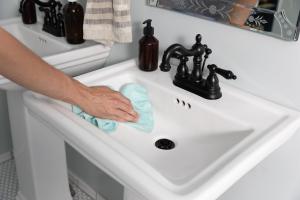Ultimate Guide to Cleaning and Shining Your Porcelain Sink

-
Quick Links:
- Introduction
- Why Choose Porcelain Sinks?
- Common Issues with Porcelain Sinks
- Essential Cleaning Supplies
- Step-by-Step Cleaning Process
- How to Shine Your Porcelain Sink
- Expert Tips for Maintenance
- Real-World Case Studies
- FAQs
Introduction
Porcelain sinks are a beautiful and classic addition to any kitchen or bathroom. They are known for their durability, aesthetic appeal, and ease of cleaning. However, like any other surface, they require regular maintenance to keep them looking their best. In this comprehensive guide, we will explore how to clean and shine your porcelain sink effectively, using sustainable and readily available products.
Why Choose Porcelain Sinks?
Porcelain sinks offer several advantages:
- Aesthetic Appeal: Porcelain has a glossy finish that can enhance the overall look of your kitchen or bathroom.
- Durability: It is resistant to scratches and chips, making it a long-lasting option.
- Ease of Cleaning: The smooth surface of porcelain makes it easy to wipe clean.
Common Issues with Porcelain Sinks
Despite their benefits, porcelain sinks can face several issues:
- Stains: Coffee, tea, and other food particles can leave unsightly stains.
- Scratches: While durable, porcelain can still be scratched if not cared for properly.
- Hard Water Deposits: Mineral buildup from hard water can dull the surface.
Essential Cleaning Supplies
Before starting the cleaning process, gather the following supplies:
- Baking soda
- White vinegar
- Liquid dish soap
- Soft sponge or cloth
- Old toothbrush
- Microfiber cloth
- Rubber gloves (optional)
Step-by-Step Cleaning Process
Step 1: Rinse the Sink
Start by rinsing the sink with warm water to remove any loose debris.
Step 2: Create a Cleaning Paste
Mix equal parts of baking soda and water to create a paste. This is a gentle yet effective cleaner.
Step 3: Apply the Paste
Using a soft sponge or cloth, apply the baking soda paste to the sink, focusing on stained areas. Let it sit for 10-15 minutes.
Step 4: Scrub Gently
Using the sponge, scrub the sink gently. For stubborn stains, use an old toothbrush to get into crevices.
Step 5: Rinse Thoroughly
Rinse the sink thoroughly with warm water to remove all cleaning paste residues.
Step 6: Use Vinegar for Hard Water Stains
If hard water stains persist, spray white vinegar on the affected areas and let it sit for a few minutes before rinsing again.
How to Shine Your Porcelain Sink
After cleaning, it's time to make your sink shine:
Step 1: Dry the Sink
Use a microfiber cloth to dry the sink completely.
Step 2: Apply a Shine Solution
Mix equal parts of vinegar and water in a spray bottle. Spray the solution over the sink and wipe with a clean microfiber cloth.
Step 3: Buff the Surface
Buff the sink with a dry microfiber cloth until it shines.
Expert Tips for Maintenance
To keep your porcelain sink looking its best, consider the following tips:
- Clean spills immediately to prevent stains.
- Avoid abrasive cleaners that can scratch the surface.
- Use coasters for hot pots and pans to prevent damage.
- Regularly check for hard water deposits and clean as needed.
Real-World Case Studies
Here are a couple of case studies showcasing the effectiveness of proper porcelain sink maintenance:
Case Study 1: The Kitchen Renewal
A homeowner in California struggled with persistent stains from coffee spills. After implementing a regular cleaning routine using baking soda and vinegar, the sink regained its original luster and eliminated stains effectively.
Case Study 2: Bathroom Revamp
A bathroom remodel in New York included a porcelain sink that had seen better days. The use of gentle cleaning agents and regular upkeep restored the sink's shine and contributed to the overall appeal of the bathroom.
FAQs
1. Can I use bleach on my porcelain sink?
It's best to avoid bleach as it can cause discoloration over time. Stick to natural cleaning solutions.
2. How often should I clean my porcelain sink?
For best results, clean your sink weekly and address spills immediately.
3. What should I do if my sink has scratches?
Minor scratches can sometimes be buffed out with a soft cloth. For deeper scratches, consider consulting a professional.
4. Is it safe to use a magic eraser on porcelain?
Magic erasers can be used sparingly, but they may cause micro-scratches, so use with caution.
5. Can I use vinegar and baking soda together?
Yes, but avoid mixing them directly as they will neutralize each other. Use them separately for effective results.
6. Are there any eco-friendly products for cleaning porcelain sinks?
Yes, products like baking soda, vinegar, and lemon juice are excellent eco-friendly cleaning agents.
7. How do I remove hard water stains?
Spray vinegar on the stains, let it sit, and scrub gently with a sponge or cloth.
8. Can porcelain sinks chip easily?
While porcelain is durable, it can chip if heavy objects are dropped on it. Always handle with care.
9. Should I use abrasive cleaners?
Avoid abrasive cleaners as they can scratch and dull the finish of your sink.
10. What’s the best way to maintain shine?
Regular cleaning with vinegar and water and buffing with a microfiber cloth will maintain shine.